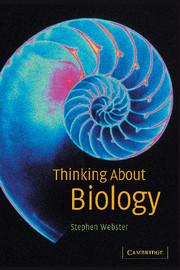Introduction
Published online by Cambridge University Press: 24 May 2010
Summary
At some point in their work, most biology students will ask themselves: why is there so much to learn? Though the deeper principles of science may be valuable, they are always in danger of being overwhelmed by the mass of detail that fills all textbooks, and attends all courses. For students and teachers alike, undergraduate courses in the biological or life sciences can easily become exercises in fact management. This is a problem for the many students interested in exploring how their subject relates to wider contexts, or who are uneasy at the narrowing choices they had to make in order to study any of the biological sciences at university. Others, who want their biology degree to be as useful as possible, need to see that science can be discussed in a way that non-scientists find compelling and important. For those who choose a career in research, the necessarily strict disciplines of laboratory life are likely to need complementing with a feeling for the philosophy of the subject: a knowledge of how biology gains its authority, how it presents itself in public, and how it relates to other sciences, to the arts and to the humanities.
The purpose of this book is to make these connections. It aims to help students find some new intellectual perspectives on their studies. This is why the book is called Thinking About Biology. Throughout, I try to illuminate two kinds of connection.
- Type
- Chapter
- Information
- Thinking about Biology , pp. 1 - 4Publisher: Cambridge University PressPrint publication year: 2003



